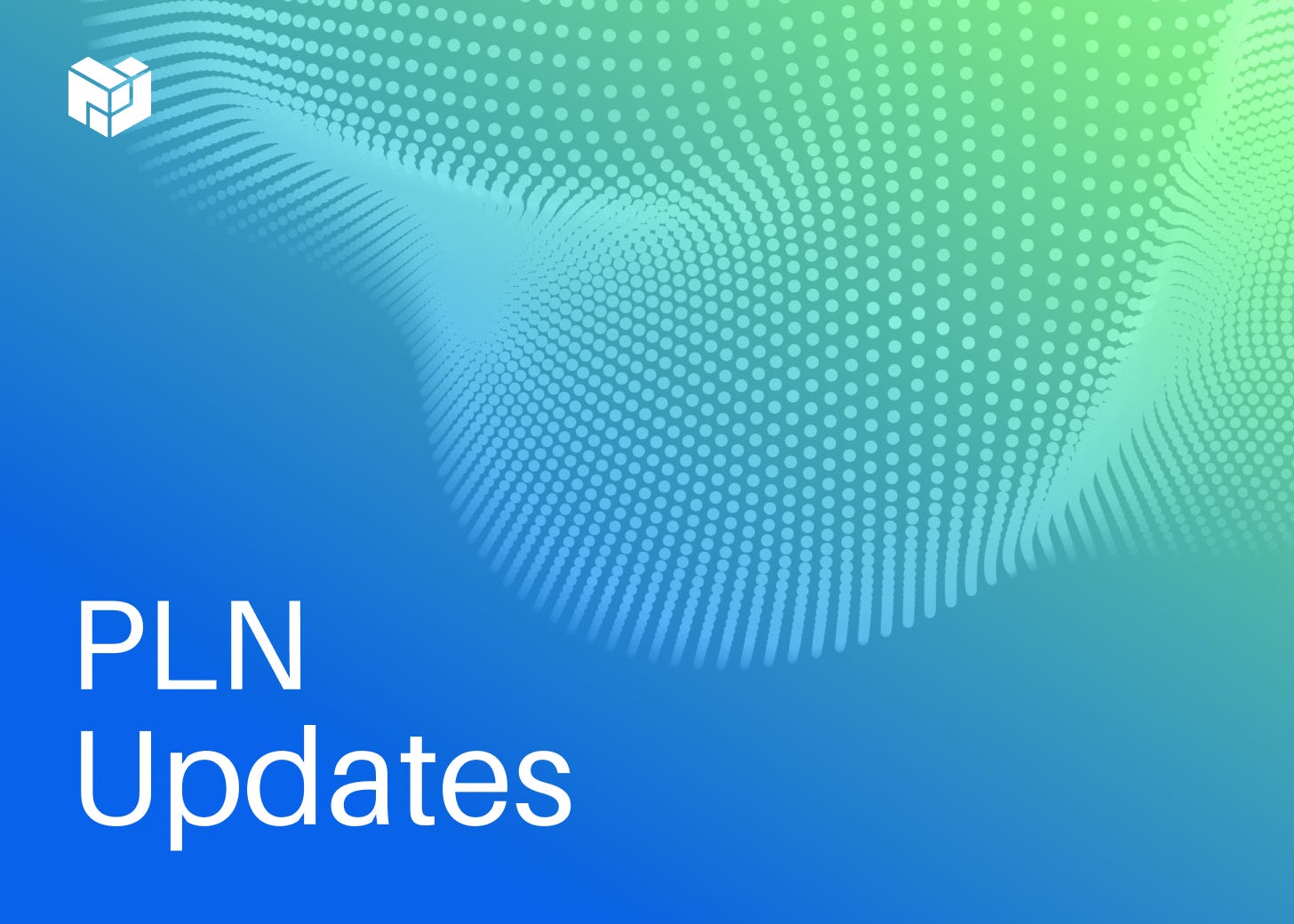PLN Updates - July 24
This edition features highlights from PLN teams @EthCC, a new image verification tool in the age of Generative AI, Authentication Service for the PLN Directory, Q&A with Gensyn & more!
⚙️ New Tool Alert: Capture Dashboard by Numbers Protocol
Shipped: June 2023
What It Is: Numbers Protocol’s Capture dashboard allows users to register images instantly on the blockchain, verifying origin and authenticity. This is valuable at a time when AI is getting smarter – just look at this year’s winner of a prestigious photography award.
Why It’s a Big Deal: From the luxury fashion industry to documentation of war crimes in Ukraine, the ability to authenticate digital media is vital in the age of generative AI when photo manipulation is easy and widespread. The company’s tech was even used to chronicle 78 days of the 2020 US presidential election with Reuters.
The Big Picture: There are major implications in this space from NFTs to politics. Research shows that generative AI will account for 10% of all data produced (vs 1% today) by 2025 – and a major blockbuster film will be released with 90% of the movie generated by AI by 2030. Let’s hope AI is good at coming up with superhero names.
—> Download the Capture app here.
📢 Introducing Authentication Service in the PLN Directory
Drum roll… Our favorite PLN Directory is leveling up with a new Authentication Service to keep personal data private as our community grows!
With authentication, every PLN member will be able to:
Log in with a variety of options, including your email or wallet.
Directly update your own Profile and Privacy Settings without waiting for Admin changes.
Keep your data private and secure as only logged in members will be able to view your contact information and location.
The bonus? We worked with PLN member Rollup.id as our user management platform, specializing in open source compliance and privacy.
—> Login here. Get verified by July 31 and we’ll send you a special PLN NFT!
📢 Announcing: New PLN Blog Series on Protocol.ai
We are excited to kick off a new blog series on Protocol.ai that dives into the ideation and execution of Web3 startups within the PLN, featuring insights into the challenges and wins along the way.
This month, we profiled Cryptosat, a startup that builds crypto-satellites that power blockchain in space. Last year, the company successfully launched two cryptographically equipped satellites, Crypto1 and Crypto2, with plans for a third later in 2023.
—> Read the blog post here.
📈 An Expanding Network
Welcome to the following team that recently joined the PLN directory!
Bluesky: A decentralized social media network building the AT Protocol for a new format for public conversation that gives creators independence from platforms and developers the freedom to build.
📡 Network Radar
Introducing Lava Network’s Lava SDK Alpha, a TypeScript/ JavaScript implementation of the Lava Protocol that enables direct p2p communications between developers and RPC Providers. The SDK makes it easy for developers to go multi-chain, manage their API's and build back and front-end environments that have direct access to blockchain data. Onboard here.
Bluesky has raised an $8 million seed round from a consortium of investors, including Protocol Labs, to support its goal of building a decentralized social media platform that can grow into a sustainable, services-led business. Read about their mission and roadmap in this blog post.
Blockchain business accelerator Cronos Labs partnered with Protocol Labs to boost Web3 adoption among startups. Cronos specializes in AI, decentralized finance and gaming. Read about the exclusive partnership here.
thirdweb has acquired Paper, adding their embedded Web3 wallet and checkout solutions to thirdweb’s blockchain development stack. Details here.
Introducing Molecule’s new product: IP Tokens (IPTs). VITA-FAST is the first IP-NFT that was tokenized as IPTs. One of the the projects Molecule successfully funded via an IP-NFT was autophagy research at the University of Newcastle. More on the new approach to scientific research funding here.
Anytype, a knowledge management tool that serves as a private hub for personal data, has officially launched their public beta this month. Check it out here.
Calling all movie fans! Artizen has a new $10,000 Match Fund for AI Filmmaking. Artizen is seeking projects that leverage generative AI to explore new forms of cinematic storytelling. Submit your project here.
Fission launched Passkey support, the startup’s third password-less developer option, for ODD SDK. Learn about the tool and much more in a replay of July’s Filecoin & IPFS Ecosystem Roundup here.
🗓 PLN @EthCC | Launchpad Summit
Virtual learning cohorts had a chance to mingle during the Launchpad Summit over five days in Paris, France in mid-July! There were over 350 attendees at the Launchpad Social alone.
—> Apply to join future cohorts here and collaborate with Launchpad or offer sponsorship here.

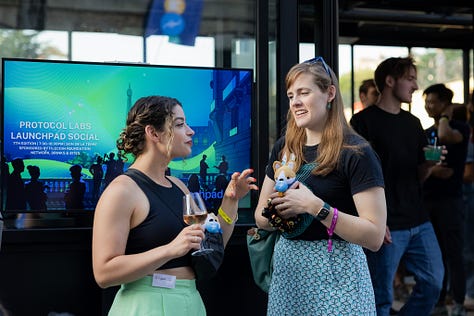

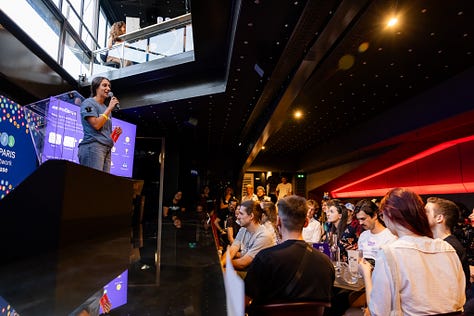
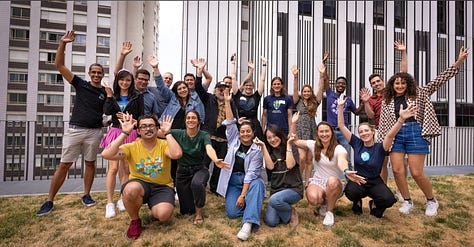
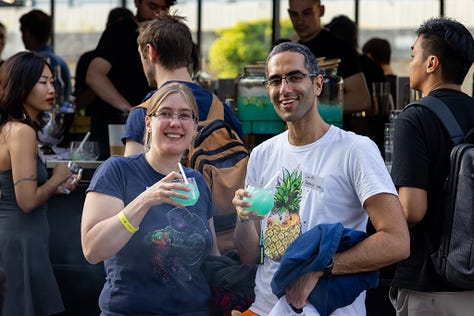
🗓 Key Event: Mark Your Calendar
Did you attend a PLN event at EthCC in Paris, France in July? There were plenty of networking and learning opportunities by the likes of Funding the Commons, Launchpad and CryptoEconLab. If you’re craving more, check out this month-long Funding the Commons Berlin Residency in Germany from September 1 to 30, designed for builders in the public goods space.
—> Sign up to attend here and register to speak here.
** And stay tuned for a very exciting LabWeek23 announcement coming soon! **
🔦 Spotlight:
The Gensyn network is a machine learning compute protocol that cuts out middlemen in the cloud industry and doesn't add extra charges. This reduces the cost of compute and creates efficiencies among underutilized devices. Get to know co-founder Harry Grieve in this Q&A.
Tell us a bit about yourself.
I grew up in Scotland and studied econometrics. In 2016, I became aware of statistical machine learning (ML) approaches applied to econometric problems when someone in my lab gave a talk on the Random Forest algorithm. I knew immediately that ML was what I wanted to do. That ultimately led me to lead the Data Research team at an applied ML startup in London, where part of our scope was to predict building fire damage.
Two things became clear to me during my time there: 1) the application of ML to all other walks of life was inevitable, and 2) that compute or data would be the key bottleneck to the growth of ML into those new areas.
Partnering with my co-founder, Ben Fielding, in February 2020, we explored both and settled on compute as the key vector for pushing the frontiers of ML. To us, solving the compute problem required uniting all of the world’s compute resources in a way that was low cost and easy to access. Researching that problem led us directly to cryptonetworks.
How did you get into Web3?
When searching for a way to orchestrate neural network training over multiple GPUs with no central party. If cryptonetworks are great for anything, it’s hardware incentivisation.
What advice would you give to someone joining Web3?
Don’t think about it as ‘joining Web3’ as it creates an in vs. out group mentality - and the best protocols are those which are credibly neutral. Instead, think of it as just using a new technology.
What challenges or rough edges would you like to see solved in Web3?
A focus on real-world unit-economics. Most people outside of crypto don’t care about decentralization (and neither do many people inside crypto, for that matter). Like all other technologies, to reach mass adoption it has to either provide access to something you couldn’t access before or provide existing access much cheaper. Core to our work on Gensyn is lowering the cost per hour to access GPUs from the currently exorbitant levels - as well as increasing the total supply of accessible devices. This is achieved well under our approach to building a Machine Learning Compute Protocol.
A credible pathway to long-term hashrate incentivisation on Bitcoin. Bitcoin represents a cultural phenomenon in the domain of payments and value storage; yet, one of its core USPs - its fixed supply - threatens its long term viability. Circa 98% of all miner revenue currently comes from block rewards. As the block rewards are halved away, that means that hashrate is less and less incentivized over time. Various solutions have been suggested about how to fix this, from Merged Mining to Bitcoin NFTs to Hyperbitcoinization. Whichever way, it’s existential and merits more focus than it currently receives.
What are your favorite podcasts or books?
I’m not a huge fan of the podcast format and prefer reading. A cross section of favorites from various genres include Heart of Darkness by Joseph Conrad, Do Androids Dream of Electric Sheep by Philip K. Dick, and Utopia by Thomas More.
Tell us something you like to do for fun.
I love Sci-Fi novels and have probably read about 20 in the past year. I’m currently reading Book 9 of the Gaunt’s Ghosts series by Dan Abnett. In 2023, the best sci-fi book I read was ‘The Moon Is A Harsh Mistress’ by Robert A. Heinlein.
📱 PLN Events
🚀 Bookmark the PLN Events Page for the most up to date events in the community. Sign up for these events coming up in the next few months:
SBS-Earth, virtual event, August 16 (Apply to speak or sign up to be notified)
Lab Day, virtual event, August 16 at 9am PST/4pm UTC
Funding the Commons, Berlin, Germany, September 8-9 (Apply to speak here)
💡Learn
Zama led an interesting workshop at EthCC Paris on Homomorphic Encryption (FHE), described as a way to process data encrypted without seeing it. Watch this recap to learn how this process aides the writing of smart contracts in Solidity:
🍿 Fun Corner
Read a good book or listened to an insightful podcast recently? Let us know.
🎤 New Pick: “Almost Impossible” Podcast
Recommended By: Craig Cannon, content creator at Protocol Labs
What It’s About: From the invention of the airplane to the creation of the Vegas strip, this inspiring podcast covers projects once deemed impossible.
📝 Tips?
Have a suggestion for the next PLN Updates newsletter? We’d love to hear from you! Contact Sara Hamdan at sara.hamdan@protocol.ai.




